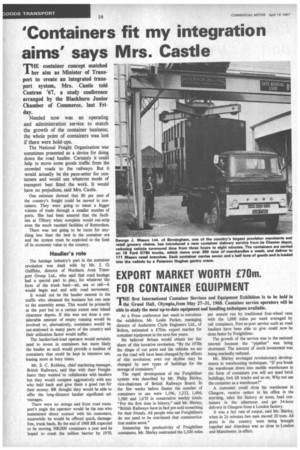EXPORT MARKET WORTH £70m.
Page 28

If you've noticed an error in this article please click here to report it so we can fix it.
FOR CONTAINER EQUIPMENT
first International Container Services and Equipment Exhibition is to be held in the Grand Hall, Olympia,from May 27-31, 1968. Container service operators will be able to study the most up-to-date equipment and handling techniques available.
At a Press conference last week to introduce the exhibition, Mr. Leslie Parker, managing director of Anderston Clyde Engineers Ltd., of Bolton, estimated a £70m, export market for container equipment in the next few years.
He believed Britain would obtain her fair share of this lucrative revolution. "By the 1970s the shape of our ports and the vehicles we see on the road will have been changed by the effects of this revolution; even our skyline may be changed by new types of buildings for the storage of containers."
The rapid development of the Freightliner system was described by Mr. Philip Shirley, vice-chairman of British Railways Board. In the few weeks before Easter the number of containers in use were 1,196, 1,332, 1,496, 1,560 and 1,670 in consecutive weekly totals. "For the first time in history," said Mr. Shirley, "British Railways have in fact pre-sold something for their friends. All people who use Freightliners do not need to be convinced that containerization makes sense."
Instancing the productivity of Freightliner containers, Mr. Shirley contrasted the 2,500 miles per annum run by traditional four-wheel vans with the 1,000 miles per week averaged by rail containers. Port-to-port service such as road hauliers have been able to give could now be done faster by Freightliner.
The growth of the service was in the national interest because the "pipeline" was being shortened. The amount of stock investment was being markedly reduced.
Mr. Shirley envisaged revolutionary developments in warehousing techniques. "If you break the warehouse down into mobile warehouses in the form of containers you will not need brick buildings, fork lift trucks and so on. Why not use the container as a warehouse?"
A customer could close his warehouse in Glasgow, receive orders in his office in the morning, telex his factory at noon, load containers in the afternoon and get 24-hour delivery in Glasgow from a London factory.
It was a fair rate of output, said Mr. Shirley, when in 2+ minutes two men moved 20 tons. All ports in the country were being brought together and Aberdeen was as close to London and Manchester, in effect.
























































































































